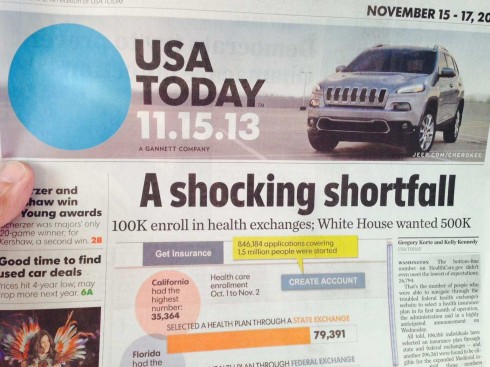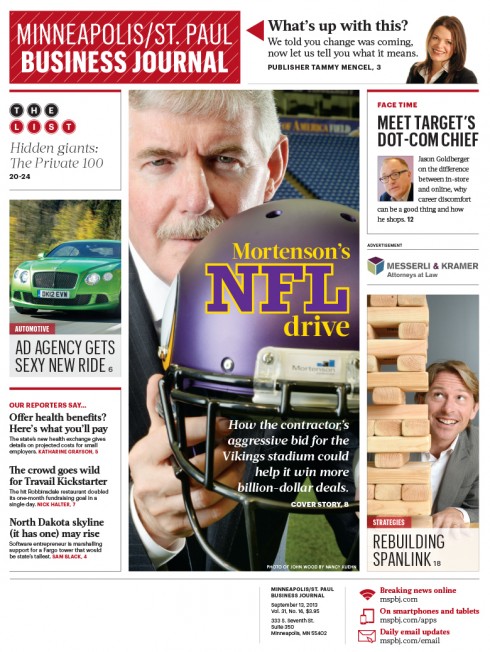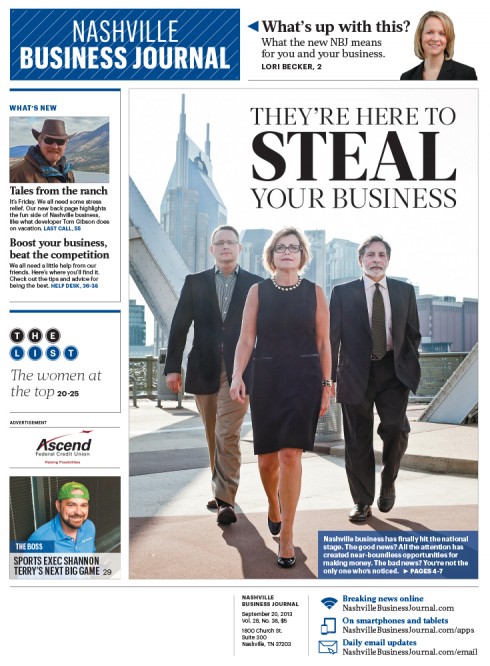TAKEAWAY: We saw it coming when the first silent ads mixed with editorial content in those early news websites; now it is called branded journalism, and the best is yet to come. Here are five reasons why 2014 will be the year of branded content making a splash.

USA Today, Nov. 15, 2014: Logo and Cherokee ad do the sponsored ad tango


Notice those “silent ads” on page ones of the newly redesigned and rethought ACBJ business weeklies: Minneapolis/St. Paul Business Journal and Nashville Business Journal.
That tango between those two sometime cool partners, or even cold adversaries—- advertising and editorial—-continues to get friendlier and better all the time.
I have seen it coming,first in those early online editions of newspapers in the early 2000s—the rise of what I refer to as “silent ads”, where a brand is promoted, but not a specific message. You would see, for example, a United Airlines ad, a small unit, smack in the middle of a navigator to the various sections of the website. So, between the news categories of Local and Opinion, you would see the logo of United Airlines, or Marriott Hotels.
This would result in more eyeballing for the “silent ad” as users turned to that most important tool in a website: the navigator. And while most news websites continue to display those sometimes ugly banner ads (that can easily be ignored), one cannot ignored a strategically placed “silent ad”. In a way, there is nothing visually silent about those ads.
I liked them from the start, and so I have incorporated them into dozens of “print” project redesigns, in most cases with great success (See the front pages of these American City Business Journals here, for example).
That was in the early 2000s, however, and that is how the flirting and the courting of ads and editorial began.
Today, the union gets stronger, more formalized and it carries the guarantee of what some of us had already suspected: advertising is information, too, and users like advertising messages that inform them.
Better yet, they like advertising that tells stories.
For the best brands, today’s strategy is not about placing their product in your face, but about telling a memorable story that reflects the brand in your brain.
The rise of branded advertising
Today, more and better examples of the union of advertising and editorial content. With a more robust union comes a new name to describe the combination, as in branded content, or, even better, branded journalism.
Branded or sponsored content on many websites mimics the editorial content that surrounds it, making it difficult for users to ignore it. And, why should they?
It’s all about the company we keep, of course, so when such titles as The Economist and The New York Times get to the dance floor to do the ad/editorial tango, people take notice. It’s Dancing with the Stars, circa 2014, the year I predict when we will see more branded journalism clamoring for our attention.
Meredith Kopit Levien, exec VP-advertising, for The New York Times, announced that The Times is planning to introduce branded content units into its redesigned website, scheduled to rollout in the first quarter of 2014.
“As part of our redesign, there will be new ad products … and at least one unit will be branded content,” she said.
We will watch with interest. And so will ad managers who handle print editions of newspapers.
Only last week, USA Today married its own logo to a six-column photo of a Cherokee Jeep. The ad was totally silent (or as silent as a Jeep aiming at the logo—and the reader—on Page One can be), and it only included, in small type, the jeep.com/cherokee website.
The reason this union between editorial and advertising is so sweet is that everyone benefits: the brands that find their messages cushioned around titles that command attention for their editorial content (and history), with the publications that desperately need the revenue that comes from such unions.
Of particular interest to publishers (and advertisers): Branded content works well in mobile devices. For example, Politico and The Atlantic, among others, see native advertising as one of the key strategies to closing the “mobile revenue gap” — the difference between their large and growing mobile readership and their relatively small mobile revenue.
For 2014, the arrival of more branded content in all platforms, and, who knows? Perhaps even projects where entire campaigns are planned and carried out around a subject between advertisers and editorial teams.
Storytellers will be needed who can do this dance well.
Five reasons why 2014 will be the year of branded content/branded journalism
—An ever growing audience that wants to be informed and entertained at all times. Branded content that is excellent excels at both.
—Brand managers who are concluding that by partnering with publishers they do more than sell a product, they sell a story that, in turn, reinforces their brand.
—We are likely to see all advertising planned via two tracks: a) one devoted to the more traditional direct-response sales pitch—selling a product, b) one devoted to selling a story, not a product, as when an airline does not sell you a seat, but a story that it wants to attach to its brand.
—Publishers are more ready to establish good relationships with advertisers who wish to tell a story via their newspaper/magazine.
—Publishers/advertisers are cementing their mutual trust, eliminating questions of ethical standards. In fact, publications are beginning to draft documents that spell out how branded content will be handled.
Of related interest:
New York Times Ad Chief: Branded Content Units Coming Soon
http://adage.com/article/media/york-times-plans-branded-content-redesigned-website/244984/?utm_source=API%27s+Need+to+Know+newsletter&utm_campaign=a8c398b955-Need_to_Know_November_14_201311_14_2013&utm_medium=email&utm_term=0_e3bf78af04-a8c398b955-31701869
Why sponsored content is promising for news organizations
Previous blog posts on the subject:
Sponsored messages cuddling up to editorial content
https://garciamedia.com/blog/articles/psponsored_messages_cuddling_up_to_editorial_content_p
Interactive, sponsorship ads: the new marriage of digital advertising, editorial
https://garciamedia.com/blog/articles/pinteractive_sponsorship_ads_the_new_marriage_of_digital_advertising_editor
Ralph Lauren and the Times: a marriage made in tablet advertising heaven
https://garciamedia.com/blog/articles/ralph_lauren_and_the_times_a_marriage_made_in_tablet_advertising_heaven/
Ads on Page One: some work, some don’t
https://garciamedia.com/blog/articles/ads_on_page_one_some_work_some_dont/
The iPad Ad Lab #1: Wrap that ad around a story
https://garciamedia.com/blog/articles/the_ipad_ad_lab_1_wrap_that_ad_around_a_story/
iPad Ad Lab #4—Those comfy advertising suites
https://garciamedia.com/blog/articles/ipad_ad_lab_4—those_comfy_advertising_suites/
iPad Ad Lab #3—Rules of engagement
https://garciamedia.com/blog/articles/ipad_ad_lab_3—rules_of_engagement/
The iPad Ad Lab #2: Kill those banners
https://garciamedia.com/blog/articles/the_ipad_ad_lab_2_kill_those_banners/
iPad Ad Lab #4—Tablet advertising that tells a good story
https://garciamedia.com/blog/articles/pipad_ad_lab_4tablet_advertising_that_tells_a_good_story_p/
It’s time to do more experimenting with advertising in print
https://garciamedia.com/blog/articles/its_time_to_do_more_experimenting_with_advertising_in_print/
Why we need to create better advertising concepts for mobile platforms
https://garciamedia.com/blog/articles/pwhy_we_need_to_do_more_advertising_for_mobile_platforms_p/
Front pages that project stories (and readers) to the next level
https://garciamedia.com/blog/articles/pfront_pages_that_project_stories_and_readers_to_the_next_level_p
Advertising across the media quartet: the Aftenposten model
https://www.garciamedia.com/blog/articles/padvertising_across_the_media_quartet_the_aftenposten_model_pdvertising_across_the_media_quartet_the_aftenposten_model_p/